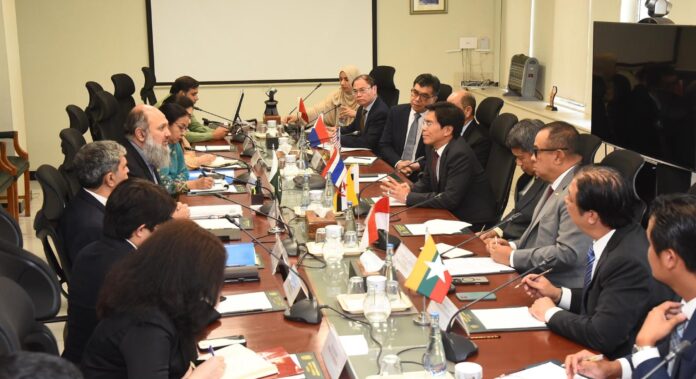Pakistan has called on ASEAN companies to invest in the country’s Special Economic Zones (SEZs) under the China-Pakistan Economic Corridor (CPEC), pointing to improved macroeconomic stability, with inflation now in single digits, and a business environment conducive to foreign investment.
Federal Minister for Commerce, Jam Kamal Khan, made this appeal during a meeting with ambassadors from seven ASEAN member states at the Ministry of Commerce on Tuesday. The minister stressed the significant potential for ASEAN companies to benefit from Pakistan’s strategic location and growing economic stability.
“We invite ASEAN businesses to invest in Pakistan’s SEZs, as we continue to make strides in creating a more attractive environment for foreign investment,” Kamal stated, emphasising that the country’s improved macroeconomic performance would provide a solid foundation for long-term partnerships.
The meeting, which included diplomats from Indonesia, Malaysia, the Philippines, Thailand, Brunei Darussalam, Vietnam, and Myanmar, underscored Pakistan’s efforts to strengthen trade and investment relations with Southeast Asia.
The minister also outlined key areas of collaboration, including technology transfer, agriculture, and infrastructure development, aiming to enhance bilateral trade and establish comprehensive, long-term partnerships.
In addition to inviting investment, Minister Kamal briefed the ASEAN ambassadors on Pakistan’s new trade policy, the vehicle import policy, tariff rationalization measures under Prime Minister Shehbaz Sharif, and progress on a Free Trade Agreement (FTA) with the Gulf Cooperation Council (GCC).
He further stressed Pakistan’s role as a gateway to Central Asia, highlighting the growing importance of the country’s ports, which have gained significance through new transit trade agreements that cut costs for regional partners.
The Minister also discussed the establishment of a Trade Dispute Resolution Commission, a new initiative aimed at resolving disputes for international companies swiftly and efficiently.
The ASEAN Ambassadors expressed support for Pakistan’s outreach, recognizing the great potential for increased commercial cooperation. The Malaysian Ambassador invited Pakistani companies to engage with Malaysia’s expanding chip-making industry, while other envoys pointed to ongoing ASEAN investments in Pakistan’s construction and power sectors.
Both sides agreed on the need to accelerate trade and investment flows, with a focus on areas such as religious tourism, skills exchange, and supply chain partnerships.
Founded in 1967, ASEAN now represents one of the world’s fastest-growing markets. Pakistan became a Sectoral Dialogue Partner of ASEAN in 1993 and is seeking to upgrade to Full Dialogue Partner status.
The meeting marked a renewed push by Pakistan to secure a more prominent position within ASEAN’s economic landscape, with both sides agreeing to chart a roadmap for increased trade, investment, and institutional cooperation in the near future.




